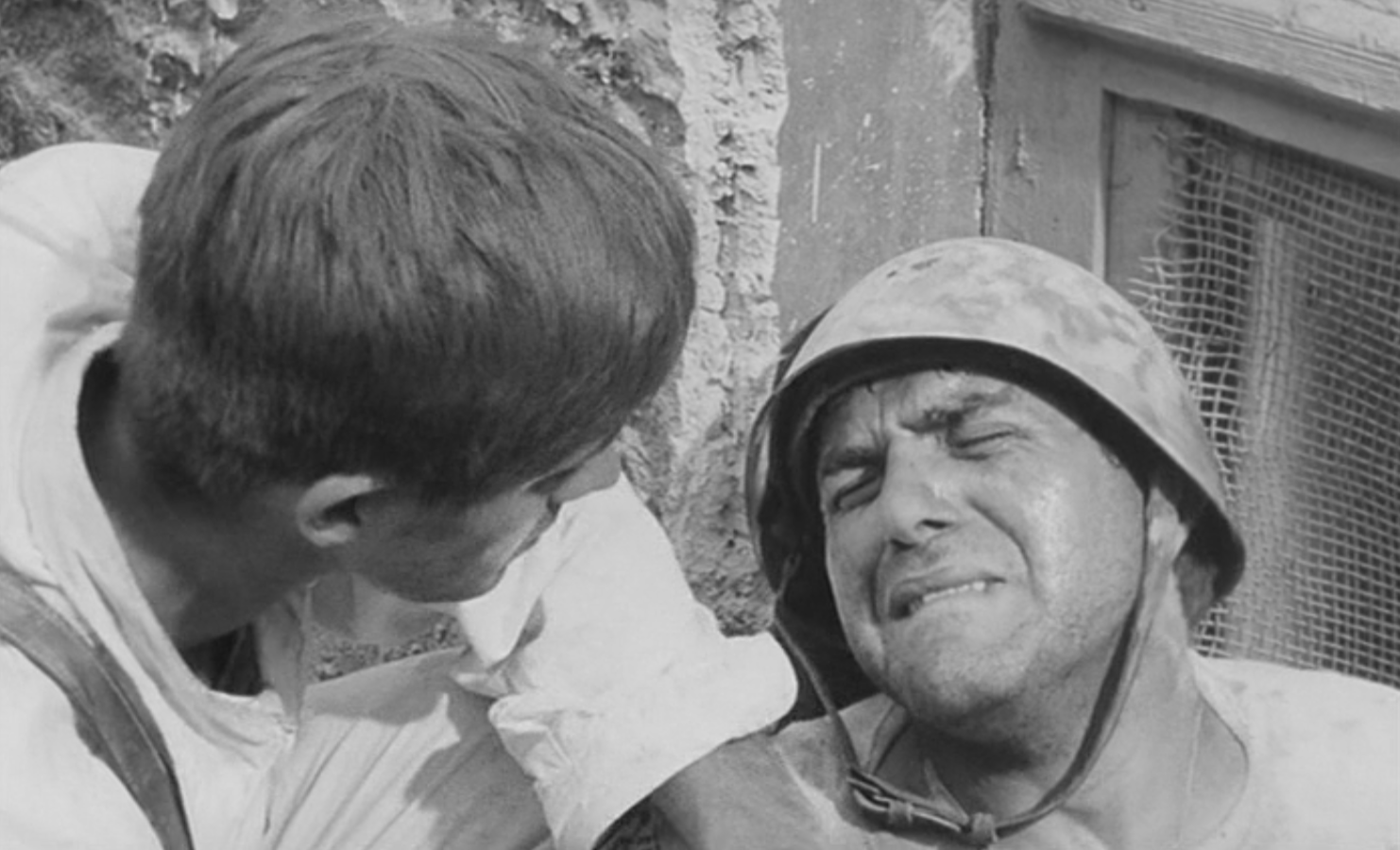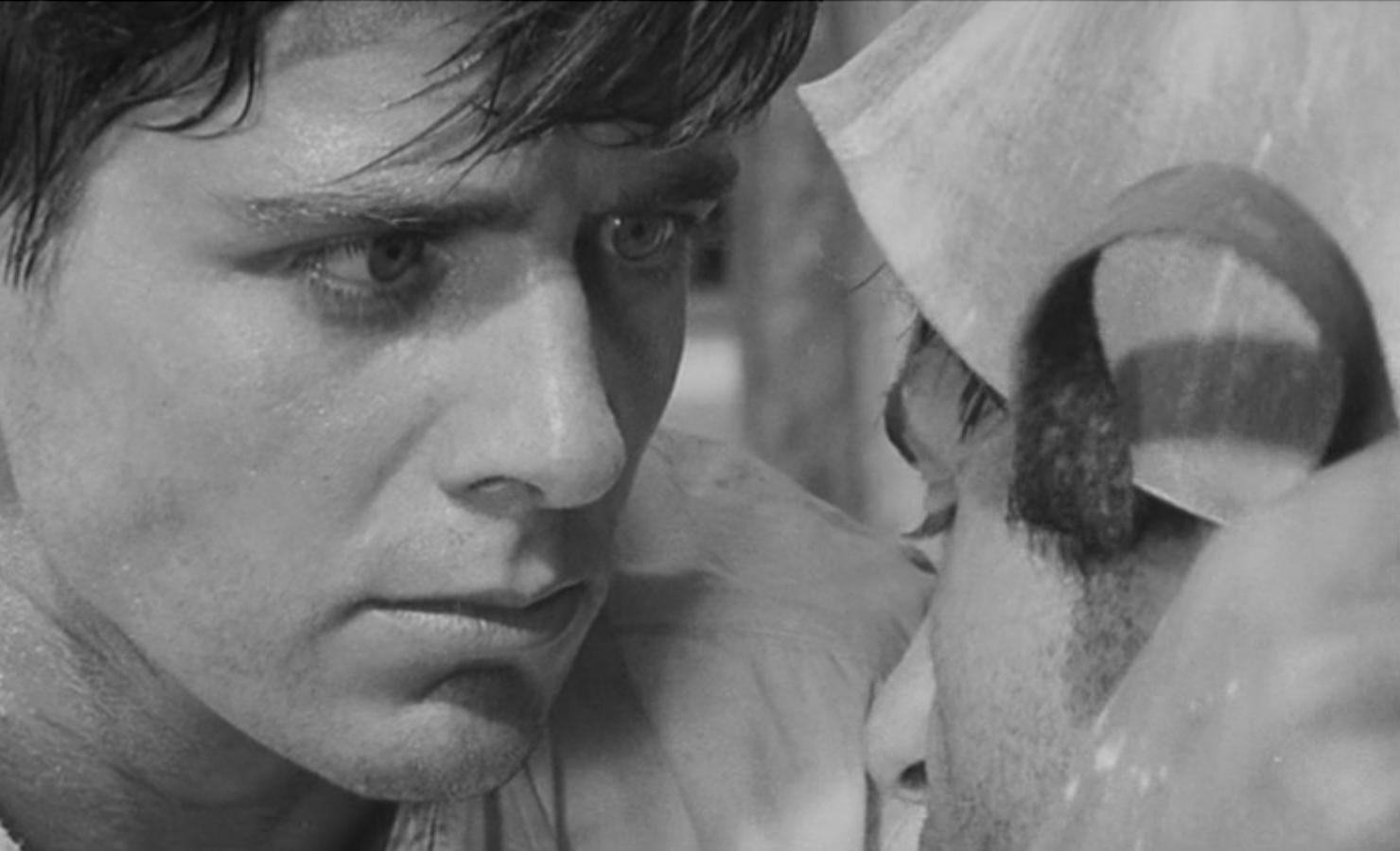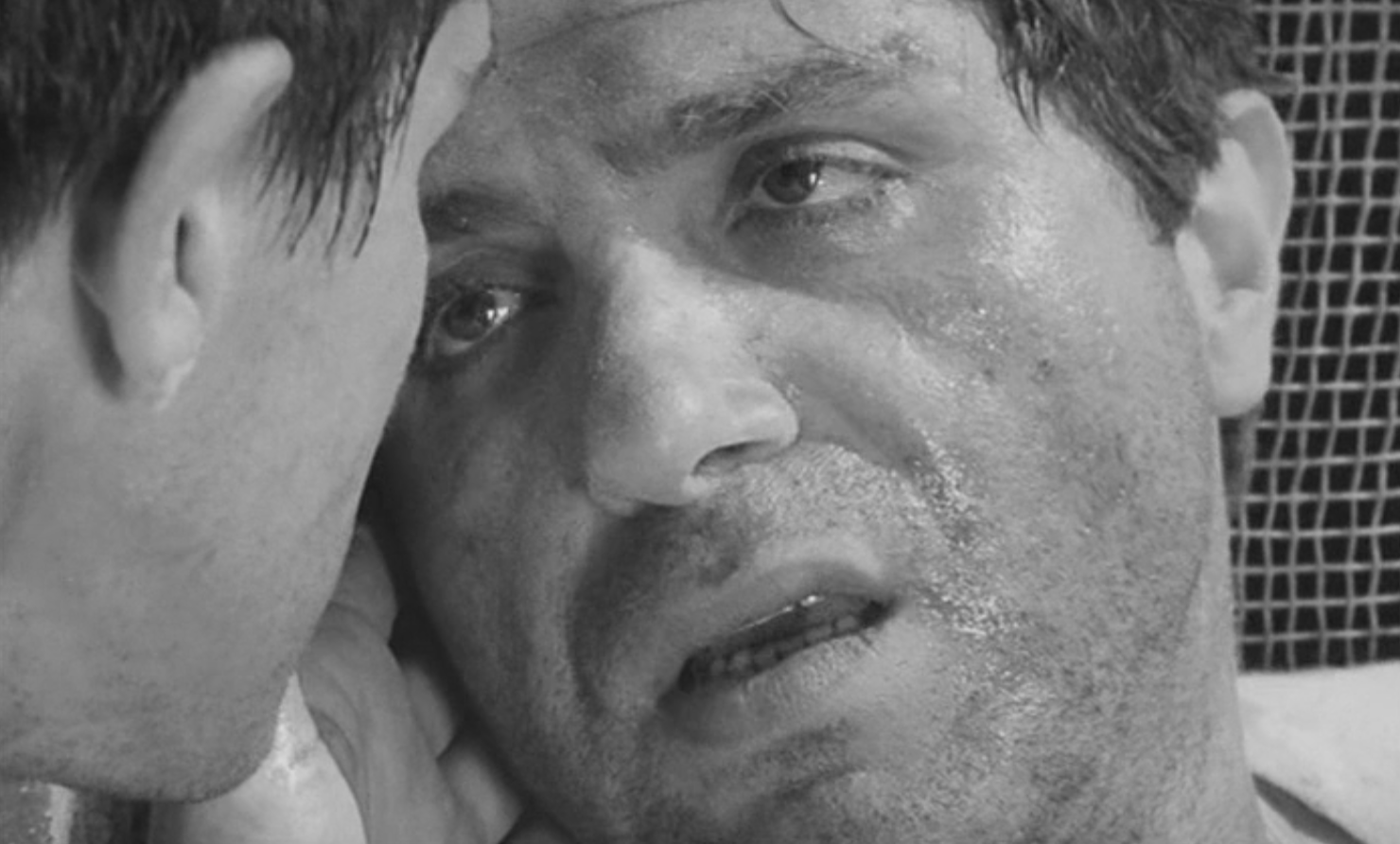Regia / Director: Nanni Loy, 1962
I due uomini sulla soglia si stanno prendendo cura del loro compagno ferito, senza prestare attenzione a Gennarino. Lui chiede loro: "Avete visto dei ragazzini là in mezzo al combattimento? Il loro capo si chiama Aiello".
"Certo! Ora ci mettiamo anche a fare la guardia ai bambini?" L'uomo calvo alza lo sguardo. "Cosa fai con quella mitragliatrice? Dammela!"
The two men in the doorway are caring for their wounded comrade, without paying attention to Gennarino. He asks them, “Have you seen boys there in the middle of the fighting? Their leader is named Aiello.”
“Sure! Now we’re also going to get involved with guarding children?” The bald man looks up. “What are you doing with that machine gun? Give it to me!”
Quando l’uomo tenta di prendere il fucile, Gennarino cerca di scappare, ma l'arma è pesante e si trascina a terra, rallentandolo. "No, è mia!" grida con la sua voce sottile e infantile. "L'ho trovata io!" L'uomo e il ragazzo lottano in strada.
When the man tries to take the gun, Gennarino tries to run away, but the weapon is heavy and drags on the ground, slowing him down. “No, it’s mine!” he cries in his thin, childish voice. “I found it!” Man and boy struggle in the street.
Alla fine, l'uomo strappa l’arma dalla presa di Gennarino, lo spinge e scappa via. Gennarino lo insegue.
Finally, the man pulls the gun from Gennarino’s grasp, pushes him, and runs away. Gennarino chases him.
Passa accanto a un gruppo di uomini che preparano le armi sul marciapiede. Gennarino chiede: "E voi che cosa fate qui? Non mi aiutate?"
"Vattene!" Riceve una spinta.
He passes a huddle of men preparing weapons on the sidewalk. Gennarino asks, “What are you doing here? Won’t you help me?”
“Go away!” He gets a push.
Corre verso l'angolo dove è in corso una sparatoria. Il fumo si diffonde nella strada.
He runs to the corner where a gunfight is underway. Smoke billows in the street.
L'uomo che si occupa del cannone è ferito. I suoi compagni lo portano al riparo.
The man tending the cannon is wounded. His comrades carry him to shelter.
Fa una smorfia di dolore e chiude gli occhi. Un altro combattente si avvicina a lui. Vedendolo in primo piano, lo riconosciamo. È l’uomo che ha cercato di scappare sulla barca all'inizio dei combattimenti. "Dopo" – dice – "quando sarà tutto finito, mi faccia un piacere. Mi porti a Sorrento. Perché è nato mio figlio".
He winces in pain and closes his eyes. Another fighter leans in close to him. Seeing him in closeup, we recognize him. It’s the man who tried to get away on the boat at the beginning of the fighting. “Later,” he says, “when it’s all over, do me a favor. Take me to Sorrento. Because my son was born.”
Ormai l’uomo calvo ha la mitragliatrice di Gennarino a tracolla e sta prendendo la mira sul nemico. Gennarino corre da lui e gli chiede: "Mi vuole ridare il mio fucile?”
"Questo non è posto per te!" risponde l'uomo.
By now, the bald man has Gennarino’s machine gun at his shoulder and is taking aim at the enemy. Gennarino runs to him and asks, “Will you give me my gun back?”
“This is no place for you!” the man answers.
"Io la guerra l’ho già fatta!" insiste Gennarino.
"Chi, tu? Ma te ne vai o no?"
"Ho combattuto con l'esercito di Aiello, te lo giuro!"
"Basta!" L'uomo lo spinge via.
“I’ve already been at war!” insists Gennarino.
“Who, you? Are you leaving or not?”
“I fought with Aiello’s army, I swear!”
“Enough!” The man pushes him away.
Il bambino cade, con uno sguardo di tradimento e abbandono. Sta cercando così duramente di dare il suo contributo.
The little boy falls, with a look of betrayal and abandonment. He’s trying so hard to make a contribution.
Guardandosi intorno, si rallegra quando vede una bomba a mano a terra. La raccoglie.
Looking around, he cheers up when he sees a hand grenade on the ground. He picks it up.
Sorridendo di nuovo, corre verso le forze tedesche. Riconosciamo le travi inclinate che sostengono gli edifici danneggiati.
Smiling again, he runs toward the German forces. We recognize the slanting beams that support the damaged buildings.
Un italiano grida: "Non sparate! È un bambino!"
L'uomo calvo grida: "Fermati!"
Ma Gennarino continua a correre.
An Italian yells, “Don’t shoot! It’s a kid!”
The bald man cries out, “Stop!”
But Gennarino runs on.
Il bambino è quasi scomparso nel fumo e nella polvere. Al cannone, gli italiani urlano disperatamente per fermare gli spari.
The boy has almost vanished in the smoke and dust. At the cannon, the Italians yell desperately to stop the gunfire.
Vediamo Gennarino* in primo piano mentre lotta per estrarre la spoletta della granata.
*Nella vita reale, Gennaro Capuozzo, di undici anni, è stato coinvolto negli scontri di strada insieme ai ragazzi del carcere minorile. È stato ucciso da una bomba a mano tedesca nel terzo giorno dell'insurrezione. https://europe-cities.com/2022/09/26/the-story-of-gennarino-capuozzo/
We see Gennarino* in close up as he struggles to pull the pin on the grenade.
*In real life, Gennaro Capuozzo, eleven years old, was involved in the street fights alongside the boys from the detention center. He was killed by a German hand grenade on the third day of the insurrection.
Quando è vicino ai carri armati tedeschi, corre in strada e lancia la granata, che non esplode.
When he is close to the German tanks, he runs out into the street and throws the grenade, which doesn’t explode.
Una raffica di spari lo abbatte. I tedeschi continuano a sparare mentre il suo elmetto di metallo rotola sul marciapiede. La macchina da presa si ferma sul suo piccolo corpo, immobile a terra.
A burst of gunfire cuts him down. The Germans continue to fire as his metal helmet rolls off on the sidewalk. The camera lingers on his tiny body, motionless on the ground.
FINE PARTE 21
Here is Parte 22 of this cineracconto. Subscribe to receive a weekly email newsletter with links to all our new posts.











































